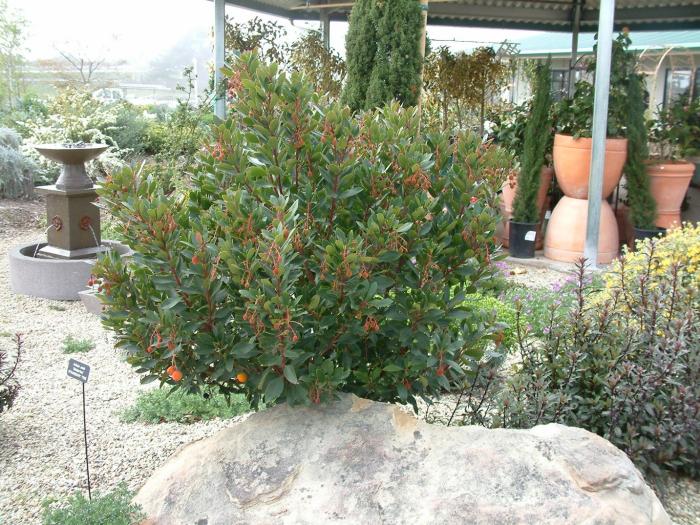Arbutus unedo
Strawberry Madrone

Description
Strawberry Madrone (Arbutus unedo) is a small-to-medium multi-trunk tree that matures at 35’ tall and 35’ wide. It has reddish-brown bark and deep green foliage. It is a great low-maintenance tree when given the space to reach maturity. This tree is appropriate in almost any garden setting with full sun and well-drained soil. It is drought-tolerant and is very attractive to wildlife, especially bees and birds. It has clusters of small, white or greenish-white, urn-shaped flowers and small, red and yellow fruit with a strawberry-like texture from which the common name is derived. This species does not have a fast-growth habit, but it does take on a dense shrub form if it is not thinned out. In the first few years, it can easily be pruned using the thinning method to cut out cross branches and other branches that are heading off in an undesirable direction. Once the plant has reached 10' tall, a licensed arborist should perform the pruning and maintenance. This tree should be planted at least three feet away from any hardscape areas, five feet from structures such as houses and buildings, and not near any powerlines. Shrubs and perennials should be planted about two feet away from this tree. It should be irrigated for about 45 minutes once a week when using most in-line drip irrigation systems.
Plant Type
Tree, Shrub
Height Range
25-40'
Flower Color
White
Flower Season
Winter, Fall
Leaf Color
Dark Green
Bark Color
Brown, Red
Fruit Color
Red, Yellow
Fruit Season
Winter, Fall
Leaf Season
Evergreen
Sun
Full
Water
Very Low
Growth Rate
Moderate, Slow
Soil Type
Sandy, Clay, Loam
Soil Condition
Average, Well-drained, Dry
Soil pH
Neutral, Basic
Adverse Factors
Allergenic, Attracts Bees, Messy
Design Styles
Mediterranean, Ranch, Seascape, Spanish
Accenting Features
Fall Color, Multi-trunk Tree, Showy Flowers, Specimen
Seasonal Interest
Winter, Fall
Location Uses
Background, Lawn, Park, Walls / Fences
Special Uses
Screen, Shade Tree
Attracts Wildlife
Birds, Wildlife
Water Saving Tip:
Water between sunset and sunrise when temperatures and wind are the lowest.